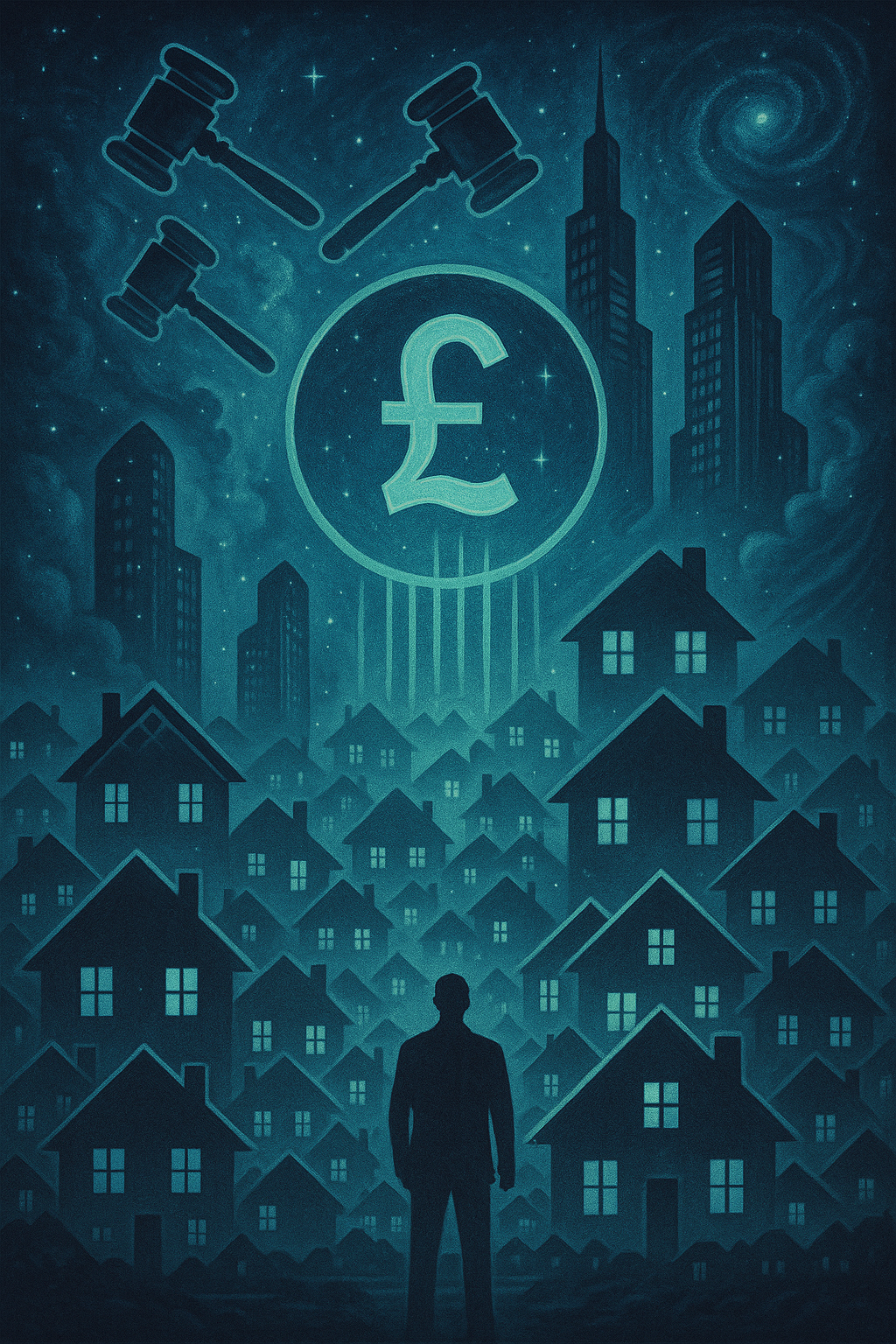The Mirage of Justice: How the UK Judicial System Undermines Law and Order
Popular articles
The UK judicial system—crowned as a beacon of fairness—stands on shaky ground. It’s not delivering justice; it’s a machine masquerading as law and order, built to favor the affluent, silence the voiceless, and cloak its own abuses. Beneath the wigs and gavels lies a paradox: a system that promises equality but thrives on exclusion, designed not to serve all but to protect a select few. If justice is unaffordable, unnavigable without wealth, skewed by targeted laws, and warped by unchecked power, what’s left isn’t order—it’s a curated chaos we’ve been too dazzled to notice. Let’s unravel the mechanisms driving this betrayal and see how they lock together.
Mechanism 1: The Affordability Barrier—Justice as a Paywall
Justice should be a universal right, but in the UK, it has become a luxury good, accessible only to those with the means to pay its price. Legal aid, once a lifeline for the disadvantaged, has been gutted—from £70.3 million in 2007 to £17.1 million in recent years, a decline that has left countless individuals without representation. Lord Chief Justice Thomas warned in 2016: “Our system of justice has become unaffordable to most.” The fallout is stark: family courts have seen a 30% rise in self-represented litigants since 2013, individuals forced to navigate a system not designed for them. A rape victim in Sunderland, armed with DNA evidence from two assailants, saw her case die when a top London firm refused her appeal form over “reputational reasons”—a euphemism for her lack of funds. Meanwhile, the government pledged £780 million for court tech upgrades, tools that benefit those already inside the system while doing nothing for the masses locked out. This isn’t access; it’s a velvet rope, a deliberate barrier that ensures justice serves the wealthy. The individual, particularly the poor, is left defenseless, their faith in law and order shattered as they face a system that demands payment for protection—a system where order exists only for those who can afford it.
Mechanism 2: Self-Representation Trap—Complexity as a Gatekeeper
For those unable to pay the price of justice, the system offers a cruel alternative: self-representation, a trap disguised as opportunity. Courts are not built for amateurs; they are a labyrinth designed for legal professionals, with rules and procedures that baffle the untrained. Lord Thomas noted in 2016 that courts are “not really designed” for self-represented litigants, a reality borne out by the struggles of those forced to navigate them. A domestic violence victim, waiting since 2017 for her trial, saw her abuser walk free—no legal aid, no chance to counter the system’s complexity. This echoes historical patterns: in the 19th century, Irish defendants at the Old Bailey faced harsher outcomes without counsel, a disparity that persists today. The rise in litigants in person—often unable to afford representation due to legal aid cuts—has led to longer case times and unfair outcomes, as judges and court staff, however well-intentioned, cannot bridge the gap. Complexity is not an accident; it’s a gatekeeper, ensuring that only the trained—or the rich—can access true justice. For the individual, this trap undermines law and order by turning courts into arenas of exclusion, where the voiceless are silenced not by law, but by the system’s own design.
Mechanism 3: Targeted Legislation—Laws as Precision Weapons
Laws should be impartial, a bedrock of order, but in the UK, some are crafted with intent, serving as precision weapons to target the inconvenient while sparing the elite. The Terrorism Act 2000 exemplifies this, granting police the power to arrest without cause, seize phones, and interrogate for six hours—no terrorism required. In 2024, a Luton journalist faced this not for any violent act, but for protecting sources on rape gangs; when he refused to unlock his phone, he was charged. This mirrors historical biases: in the 1800s, Irish suspects in London courts received heavier sentences, a pattern of disparity that continues today, with minorities—only 7% of police and 10% of judges are non-white—feeling the skew, as noted by the Economics Observatory in 2023. Underrepresentation in the system fuels distrust, as those targeted by such laws see not order, but oppression. These laws are not tools of justice; they are scalpels, carving out dissenters—journalists, activists, minorities—while the compliant elite remain untouched. For the individual, this mechanism erodes law and order by revealing a system that prioritizes control over fairness, where laws are wielded not to protect, but to punish the powerless.
Mechanism 4: Unchecked Power—Judges and Police as Untouchables
The enforcers of justice—judges and police—should be its guardians, but in the UK, their unchecked power often undermines the order they are meant to uphold. Judges enjoy immunity from defamation suits, a shield that protects even their most questionable actions, while police exploit laws like the Terrorism Act to make arrests without warrants. In 2018, a Leeds man was jailed after a 10-minute trial for asking standard questions of rape gang defendants, only to be beaten half-dead in a “bad prison.” Contrast this with a Sunderland case: despite two DNA samples from a rape, police arrested the victim’s brother instead, a gross misuse of power. CPS rape convictions remain dismal, at 33% above 2019 lows but still far below 2010 rates, with cases languishing or vanishing entirely. This lopsided power dynamic—where judges and police bend rules not for justice, but to protect their own—creates a system where accountability is a ghost. For the individual, this mechanism shatters the illusion of law and order, replacing it with a reality where those meant to uphold justice are its greatest betrayers, leaving the vulnerable to suffer the consequences of their impunity.
Mechanism 5: The Backlog Burden—Delay as a Denial
Justice delayed is justice denied, and in the UK, court backlogs have turned this adage into a lived reality, eroding the system’s ability to maintain order. By September 2022, the Crown Court backlog exceeded 60,000 cases, a crisis that has only worsened, with serious cases often scheduled 18 months to two years out. A Birmingham man, accused of theft in 2023, spent over a year on remand—longer than many sentences for his alleged crime—before his case was heard, only to be acquitted due to lack of evidence. The delay cost him his job, his home, and his mental health, a stark reminder that backlogs do not merely inconvenience; they destroy lives. This burden falls heaviest on the vulnerable, who cannot afford private legal solutions to expedite their cases, leaving them in limbo while the system grinds on. For the individual, this mechanism undermines law and order by transforming justice into a waiting game, where the innocent suffer as much as the guilty, and the promise of timely resolution becomes a hollow lie.
Mechanism 6: The Representation Gap—Diversity as a Mirage
A judicial system should reflect the society it serves, but in the UK, a stark representation gap ensures that justice remains alien to many, weakening its claim to order. Only 7% of police officers and 10% of judges are non-white, despite 15% of the population being non-white, a disparity that breeds distrust among minority communities. In 2024, a Bristol woman of Caribbean descent, facing a minor drug charge, stood before an all-white judicial panel; her cultural context—poverty, systemic bias—was dismissed, and she received a harsher sentence than her white co-defendant. This lack of diversity isn’t new: in the 19th century, Irish defendants at the Old Bailey faced similar biases due to underrepresentation on juries. For the individual, this gap undermines law and order by creating a system that feels foreign and hostile, where justice is dispensed by those who cannot understand the lived experiences of those they judge, perpetuating a cycle of alienation and inequity.
Mechanism 7: The Privatization Pitfall—Profit Over Justice
The creeping privatization of judicial functions, such as the probation service, has introduced a profit motive that undermines the system’s commitment to law and order. The UK’s attempt to privatize probation in 2015 failed spectacularly, with companies prioritizing cost-cutting over rehabilitation, leading to higher reoffending rates—up 22% in some regions by 2019. A Manchester man, released on probation in 2023, was assigned to a private firm that failed to provide mandated support; he reoffended within months, a direct result of the system’s focus on profit over people. Even after the government brought probation back under public control, the damage lingered, with overworked staff unable to meet demand. For the individual, this mechanism erodes law and order by prioritizing financial gain over societal good, turning justice into a commodity where the vulnerable are left to fall through the cracks, and the promise of rehabilitation becomes a casualty of capitalism.
How the Puzzle Fits Together
These mechanisms don’t just coexist—they interlock, creating a system where justice is a mirage. Affordability locks out the poor—£150 per head on justice vs. Denmark’s €338 (2016)—leaving them prey to the self-representation trap, where complexity buries the untrained. Targeted legislation picks off the inconvenient—working-class agitators or minority voices—while unchecked power lets judges and police rig the outcome, from 10-minute trials to dropped rape kits. The pieces click: wealth buys entry, laws silence threats, and enforcers mop up. Backlogs—60,000+ Crown cases in 2022—grind it slower, trust erodes (55% for judges, 21% for MPs)—it’s not broken by chance; it’s built this way.
The Mechanisms in Action
Guildford Four (1989): Coerced confessions, fabricated evidence—police and judges colluded, 15 years stolen. Affordability and power flexed—no self-rep could’ve fought that.
Stephen Lawrence (1993): Racist murder, botched police work—targeted bias and unchecked abuse delayed justice decades. Complexity crushed the family’s early pleas.
Post Office Horizon (2019): 900+ sub-postmasters prosecuted over faulty tech—laws targeted the powerless, judges nodded along, £58 million later, no reckoning.
A Deeper Cut
Philosophically, this offends. Rawls’s “veil of ignorance” demands blind fairness—here, class and cash peek through. Bentham’s utility—greatest good for the most—flops when the fewest wallets win. It’s a design, not a glitch: legal aid cuts starve access, targeted laws prune dissent, unchecked power guards the gatekeepers. The UK spends big on courts but starves the entry—order’s a facade, chaos rules beneath.
Subscribe to unlock premium content
Sed at tellus, pharetra lacus, aenean risus non nisl ultricies commodo diam aliquet arcu enim eu leo porttitor habitasse adipiscing porttitor varius ultricies facilisis viverra lacus neque.
The Great Wealth Generation Act 1.0

The Great Democracy Restoration Act

UK Nutrition Act 1.0

The Great Wealth Generation Act 1.0

The Great Democracy Restoration Act

The Great Wealth Generation Act 1.0







